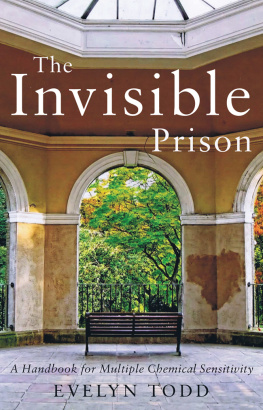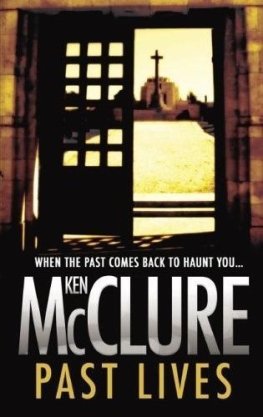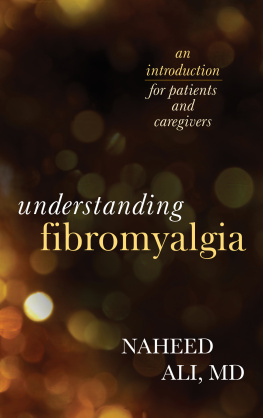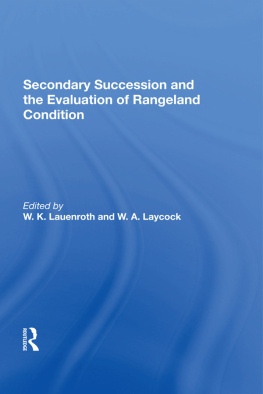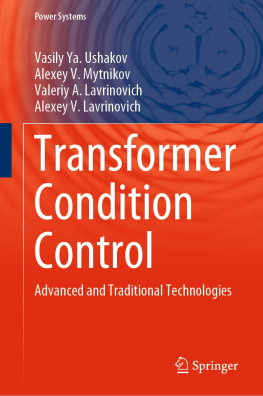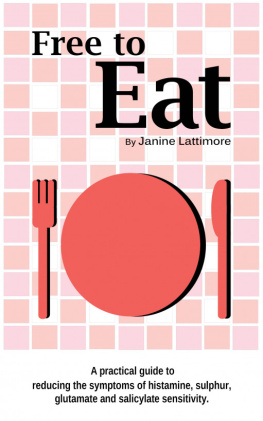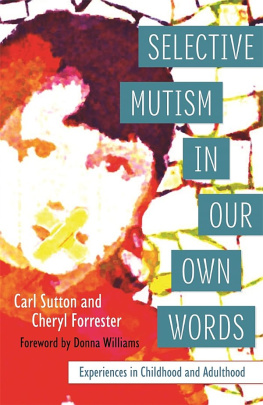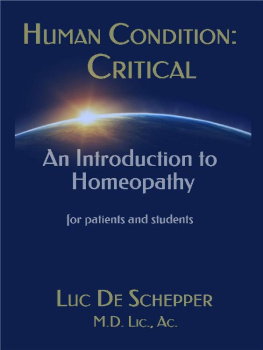
A HANDBOOK FOR MULTIPLE
CHEMICAL SENSITIVITY
EVELYN TODD

Copyright 2015 Evelyn Todd
The moral right of the author has been asserted.
Apart from any fair dealing for the purposes of research or private study, or criticism or review, as permitted under the Copyright, Designs and Patents Act 1988, this publication may only be reproduced, stored or transmitted, in any form or by any means, with the prior permission in writing of the publishers, or in the case of reprographic reproduction in accordance with the terms of licences issued by the Copyright Licensing Agency. Enquiries concerning reproduction outside those terms should be sent to the publishers.
Matador
9 Priory Business Park
Kibworth Beauchamp
Leicestershire LE8 0RX, UK
Tel: (+44) 116 279 2299
Fax: (+44) 116 279 2277
Email:
Web: www.troubador.co.uk/matador
eISBN 978 1784628 345
British Library Cataloguing in Publication Data.
A catalogue record for this book is available from the British Library.
Matador is an imprint of Troubador Publishing Ltd
The cover picture is of a solarium in the Valley Gardens, Harrogate. It can be taken as symbolic of life with MCS inside a drab room but with attractive, enticing possibilities outside that cannot be reached because there are bars. Hopefully, some day and with luck perhaps, it may be possible to climb over those bars.
Photograph by Paul Baxter of Baxter Photography
Paulmbaxter.com
CONTENTS
.
.
.
.
.
.
.
INTRODUCTION
The aim of this book is threefold: firstly, to provide as much information and advice as I can, for those with Multiple Chemical Sensitivity, on how to manage their condition; secondly, to raise awareness of, and in so doing explain, Multiple Chemical Sensitivity to any who come into contact with them and to describe the problems it poses to the sufferers and their families in their daily existence and hence their needs.
As, to my knowledge, nothing of this sort has been written on this side of the Atlantic, I hope to raise awareness of the condition especially among health professionals for whom this is paramount. I hope they will consent to read this at least the salient parts of it. For them it should make easy reading. Hopefully it will not be long before the condition is recognised as a physical illness in this country, as it is in others in the developed world, which is my third aim.
I have collected as much information and advice about the condition, from now on sometimes referred to as MCS, as I have been able. I embarked on talking on the telephone to as many people as I could who suffer from MCS. It had to be by phone or email because for us it is difficult, sometimes it is impossible, to travel, visit other peoples homes or receive visitors. Therefore, this has had to be a desktop study.
Very early on in my research it became apparent that I must try to make our common plight public as soon as possible. Unlike most other conditions it is important that everyone coming near someone with MCS understands, at least roughly, what their problem is. For example, hopefully, to stop the teenager in their presence suddenly bringing out a spray and spraying themself with perfume. Also, that those enquiries about the use of air fresheners or contents of food are honestly answered.
At the outset I had decided to discount any revelations that seemed to carry any suggestion whatever of exaggeration or theatricality or for any other reason caused me to doubt their validity. Believe me, my professional experience has left me prone to be both dubious and suspicious of much I am told. But, to date, I have found none that fits those categories in those who truly have the condition. There are many persons who find themselves suffering from a sensitivity to one or two particular chemicals but they are not considered here. With us multiple means multiple.
I have been surprised at the factual and calm manner by which people I contacted related to me serious daily difficulties they were, and still will be, encountering. In short I have been impressed by their courage and stoicism. However, most of those I contacted had at one time or other volunteered to give advice and support to other sufferers. This makes them an untypical sample, leaving me to fear that there is a hidden unknown number out there, perplexed and unaware how to cope.
At the time of writing, although Multiple Chemical Sensitivity is recognised as a serious illness in Germany, Denmark, Austria, Luxembourg, Japan, Canada and the USA, it is not recognised in the UK. Why, I ask? As it is not a recognised condition we have to pay Value Added Tax on items such as the necessary vapour masks which normally, as they are for medical use, we should not. Amongst all our other problems this is an additional unkindness. Recently I was charged two pounds each Value Added Tax on the carbon filters I need to protect me in my own home. Why is Britain lagging behind in recognition?
The prevalence of the condition in this country as it is not an official illness is not known. Figures I have seen have been 0.5% Germany, 3.7% Sweden, 3.8% Japan and 3.9% USA respectively for the severest form whilst figures given for a more moderate varied between 9% and 33%. As I have indicated there are large numbers of people who find that one or more chemicals that they encounter in their daily life make them unwell but the problem can be overcome perhaps by an analgesic or an inhaler. But with Multiple Chemical Sensitivity numerous chemicals are involved and the symptoms are severe and disabling.
Some people, as I was for many years, and even their doctors, will be unaware that chemical pollution causes their symptoms. To other patients it has become all too obvious but there may be little advice available to them. We find ourselves living in an insecure no-mans-land. Some professionals acknowledge the existence of our condition but many do not. Most have little knowledge or understanding of it. This is most unfortunate, can cause us much discomfort and could prove dangerous. Any facilities or a protocol necessary for our care when in hospital, if they do exist in this country, must be extremely rare.
Some years ago I walked up to the reception desk in Moorfields Eye Hospital in London. I merely had to repeat the diagnosis made by my GP of a suspected detached retina and everything was immediately set in motion. I was dealt with swiftly and efficiently and later that morning emerged outside once again, clutching a card for a follow-up appointment. Mentioning the letters MCS should also be met with equal understanding.
Currently most MCS sufferers, whatever other condition takes them to a hospital, will have to explain MCS and negotiate to be protected from the ambient gases, other patient perfumes, etc., request the concessions to diet and other things. As well as this, they also hope to describe the problem that has brought them there. They will also hope that admitting to MCS will not stop their other symptoms being taken seriously.
At a time when they are at their most anxious and vulnerable, some staff, being ignorant of the condition, are as likely to be impatient and sceptical as they are to be understanding. Thus, as well as suffering from their presenting condition, the patient is likely to suffer complications they could have been protected from. This could be dangerous. My personal experience has been that health professionals are kind and eager to do their best but difficulties arise because, mostly, they have no knowledge of the condition. I believe that the harm and discomforts I have suffered over the years in various places have been purely the result of ignorance.

